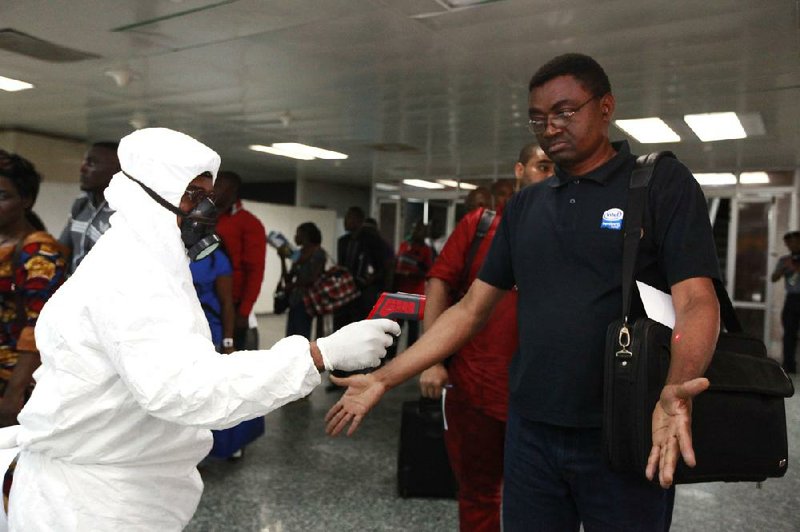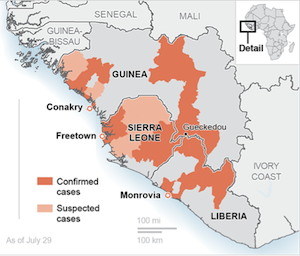LAGOS, Nigeria -- Nigerian authorities rushed to obtain isolation tents Wednesday in anticipation of more Ebola infections as they disclosed five more cases of the virus and a death in Africa's most populous nation, where officials are trying to keep the disease confined to a small group of patients.
The five new Nigerian cases were all in Lagos, a megacity of 21 million people in a country beset with poor health care infrastructure and widespread corruption. All five were reported to have had direct contact with one infected man.
Late Wednesday, Liberian President Ellen Johnson Sirleaf declared a state of emergency in the West African nation, saying that some civil rights may have to be suspended as a result of the crisis.
Observers say the crisis in Liberia has deepened because many people are choosing to keep their ill relatives at home instead of taking them to isolation centers.
The disease has killed at least 282 people in Liberia.
The World Health Organization began a meeting Wednesday to decide whether the crisis, the worst recorded outbreak of its kind, amounts to an international public-health emergency. At least 932 deaths in four countries have been blamed on the illness, with 1,711 reported cases.
In recent years, the WHO has declared an emergency only twice, for swine flu in 2009 and polio in May. The declaration would probably come with recommendations on travel and trade restrictions and wider Ebola screening. It also would be an acknowledgment that the situation is critical and could worsen without a fast global response.
The group did not immediately confirm the new cases reported in Nigeria. And Nigerian authorities did not release any details on the latest infections, saying only that they all had come into direct contact with the sick man who arrived by plane in Lagos late last month.
In a separate announcement, the WHO said it is convening a panel of medical ethicists to explore the use of experimental treatments for Ebola, which has a mortality rate as high as 90 percent.
"We are in an unusual situation in this outbreak," Dr. Marie-Paule Kieny, the organization's assistant director general, said in the announcement. "We have a disease with a high fatality rate without any proven treatment or vaccine."
Several experimental options are under development, including an untested drug that was administered to two American health workers from Samaritan's Purse, a Christian relief group based in Boone, N.C. They had been treating Ebola patients in Liberia and contracted the disease.
The announcement cited the Americans' apparent response to the drug, saying it had "raised questions about whether medicine that has never been tested and shown to be safe in people should be used in the outbreak and, given the extremely limited amount of medicine available, if it is used, who should receive it."
But President Barack Obama told reporters Wednesday that the U.S. would not send supplies of the drug, ZMapp, to the epicenter of the outbreak because it's unclear whether the drug is actually helpful. It's "premature," Obama said, to discuss fast-tracking the approval process for Ebola drugs until more information about their effectiveness is known.
Obama said the outbreak continues to grow in part because the affected countries have weak public-health systems that have been overwhelmed by the challenge of quickly identifying and isolating Ebola patients.
Although the U.S. must take the crisis seriously, Obama said, Ebola can be "controlled and contained very effectively if we use the right protocols."
However, Saudi officials on Wednesday reported a suspected Ebola death, underscoring the risk of the disease spreading by air travel even as many airlines curtail their flights to the most infected cities.
Saudi news media said the citizen, a businessman in his 40s, died Wednesday at King Fahd Hospital in Jidda after exhibiting Ebola-like symptoms and that Saudi health officials had submitted biological samples from the patient to laboratories in the U.S. and Germany.
The Saudi accounts emphasized that the illness had not yet been identified, and they did not specify where the patient got sick. But Gregory Hartl, a spokesman for the World Health Organization, said in an email that the patient appeared to have been in Sierra Leone on business in some of the affected areas.
In New York, a man who appeared at a hospital with a high fever and gastrointestinal symptoms after a visit to West Africa tested negative for the Ebola virus, health officials said.
The man has been kept in isolation since he arrived at Mount Sinai Hospital early Monday. He was in stable condition and was improving, said the hospital, which didn't disclose what illness he has.
The Centers for Disease Control and Prevention said six people in the U.S., including the New York patient, have been tested for Ebola since the West African outbreak began this year, and all results were negative.
Border patrol agents at airports in New York and Washington have been told to ask travelers about possible exposure to the virus and to be on the lookout for anyone with a fever, diarrhea, red eyes or other symptoms. But health officials say the threat to Americans in the U.S. remains relatively small.
Ebola, which causes some victims to bleed from the eyes, mouth and ears, can only be transmitted through direct contact with the bodily fluids of someone who is sick -- blood, semen, saliva, urine, feces or sweat. Millions in Lagos live in cramped conditions without access to flush toilets. Signs posted across the city warn people not to urinate in public.
Nigeria is the fourth West African country to be hit by the Ebola outbreak since it first emerged in March in the remote tropical forests of Guinea. The disease then spread to neighboring Sierra Leone and Liberia before reaching Nigeria.
Nigerian authorities said Tuesday that doctors did not suspect Patrick Sawyer was suffering from Ebola when the 40-year-old Liberian-American arrived by plane late last month in Lagos.
Sawyer, who worked for the Liberian government in Monrovia and had a wife and three young daughters in Minnesota, was on a business flight to Nigeria when he fell ill. Officials said a nurse who treated him has died and five others are sick with Ebola, including a doctor involved in his care.
Authorities in Liberia said Sawyer's sister had died of Ebola, though Sawyer said he had not had close contact with her while she was ill.
In announcing Sawyer's death, Health Minister Onyebuchi Chukwu maintained late last month that Nigerian officials had been vigilant in isolating him.
But Chukwu's comments were at odds with remarks made Tuesday by the Lagos state health commissioner, who said doctors did not suspect Ebola immediately and identified Sawyer as a possible case only after he had been hospitalized for about a day.
Experts say people infected with Ebola can spread the disease only after they show symptoms. Because the incubation period can last up to three weeks, some of the Nigerians who treated Sawyer are only now showing signs of illness.
Chukwu said Wednesday that special tents would be used to establish isolation wards in all of Nigeria's states. Authorities were setting up an emergency center in Lagos to deal with Ebola and expected the facility to be "fully functional" by today, he said.
Information for this article was contributed by Maram Mazan, Krista Larson, Maria Cheng, Mike Stobbe, Bashir Adigun and staff members of The Associated Press; by Rick Gladstone of The New York Times; and by Tony Pugh of the McClatchy Washington Bureau.
A Section on 08/07/2014


